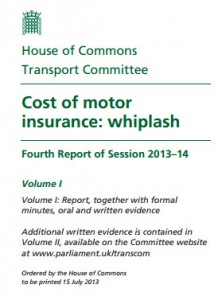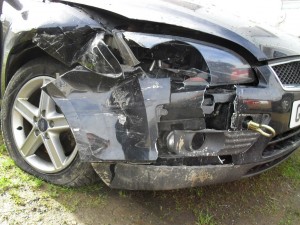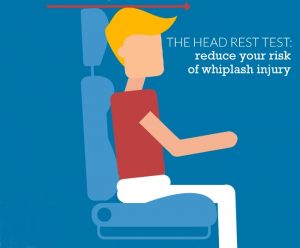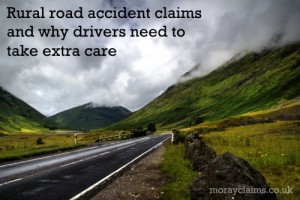You have been involved in a road traffic accident with another vehicle, which was not your fault. You have suffered injury as a result. You need to make a claim for your injuries and other losses. Motor insurance is compulsory and so the aim will be to make the claim against the insurers of the third party driver. What are the details you need to get from the other party involved in the accident? Aside from the situation where you are not able to get the information at the scene because you or the other driver is so seriously injured, it can be helpful if you can manage to get: (most important of all) the registration number of the other vehicle the make, model and colour of the other vehicle the name and address of the driver of the other vehicle the name and address of the insurers of the other vehicle the policy number or claims reference number for the other party and their insurers. If the police attend the scene of the Continue Reading
Whiplash Injury: UK Insurers Told By MPs To Sort Out Their Practices
MPs consider the effect of whiplash claims on motor insurance premiums The UK Parliament’s Cross-Party Transport Select Committee published its report “Cost of Motor Insurance: Whiplash” on 31 July 2013. The Westminster Government’s perception is that there is an increasing number of whiplash personal injury claims following road traffic accidents – some of which are invented by the supposed victims and, even where genuinely-based, the extent of the injury is often exaggerated. In the Government’s eyes, this is pushing up the cost of motor insurance. The Government has described the UK as “the whiplash capital of the world”. The Select Committee considered these issues as part of its remit. What is Whiplash and Why is it Problematic? The definition for whiplash used by the Committee was: “The neck pain which occurs after the soft tissue in the spine has been stretched and strained when the body is thrown in a sudden, forceful jerk.” This is a typical result of the Continue Reading
Bicycle and Motorcycle Accidents Reduction – Thanks to the Weather
Statistics published by the Department for Transport on 01 August 2013 reveal that the number of motorcycle and bicycle accidents on Great Britain’s roads has dropped since last year – something that can probably be attributed to the weather. The Quarterly Provisional Estimates record how many road accidents occur in the four quarters of each year. Experts can then analyse year-on-year trends, helping us to understand what effect the weather has on the safety of our roads. The most recent data makes for interesting reading because it shows the amount of motorcycle and bicycle accidents in the first quarter of 2013 (January to March) has decreased significantly from the same period in 2012. The number of pedal cycle casualties fell by 23% compared to the same period in 2012 while the number of motorcyclist casualties dropped by 27%. So what was the reason for the reduction in the number of accidents? The overall UK average temperature during the first three months of 2013 Continue Reading
Not Wearing A Seatbelt: How It Can Affect Your Personal Injury Claim
General issues about contributory negligence in PI cases In many personal injury claims, though it’s clear that the accident was the fault of someone else – which means the claim should succeed - there can be arguments about whether you as the injured person should share some of the blame for the accident. This is what is referred to as contributory negligence. It is often possible to counter arguments for contributory negligence, meaning that your claim succeeds in full. It is up to the other side to prove contributory negligence applies in the circumstances rather than being up to you to prove that you did take proper care for your own safety. If contributory negligence applies, your compensation will be reduced. In our experience, across the personal injury accident spectrum, reduction rates most often tend to be in the 10% to 25% range. In other words, for example, if contributory negligence is 25% then you lose one quarter of your damages. Why the level of Continue Reading
Failure to Wear a Cycle Helmet: Can You Still Claim for Injury?
If you are involved in a road traffic accident while riding a bicycle, are you still eligible to make a claim for compensation if the accident was not your fault but you were not wearing a cycle helmet at the time? The answer is very likely ‘yes, you can still claim successfully'. The issue which arises is contributory negligence. No Legal Requirement to Wear a Cycle Helmet Unlike seatbelts in cars, there is no legal obligation to wear a cycle helmet. In theory, this would not prevent a finding of contributory negligence in any event. With seatbelt cases, the introduction of the legal requirement in the 1980s did not affect the various, fixed levels of contributory negligence that had been developed by the courts during the 1970s (and which still apply today). However, there do not seem to be any reported decisions of the courts to date in which a cyclist has had his or her compensation reduced for contributory negligence due to failure to wear a cycle helmet. The English Continue Reading
If someone runs into the back of you, is it always their fault?
Rear-end collisions are usually blamed on the driver behind — but there are rare situations where responsibility can be shared. The general rule is that, if you run into the back of another vehicle, you will usually be held at fault and will not be able to claim against the driver in front. This is because drivers are expected to leave enough space to stop safely if traffic ahead slows or stops unexpectedly. This law seems to be generally well understood. What if the driver in front behaved unreasonably? Many people assume sudden or unexpected braking automatically shifts blame — in most cases, it doesn’t. From time to time, we get enquiries from people who have rear-ended another vehicle but consider that the accident was not their fault because the driver in front stopped their vehicle suddenly or without good reason. An example of this is where you are second in the queue at a T-junction and you and the car in front are both turning left. You can see there is Continue Reading
Can I Choose My Own Personal Injury Solicitor?
The answer is generally “yes”. Please read on for an explanation. In many situations if you have been injured as the result of an accident, you will have other property losses that will be insured and you will be contacting your insurers to claim for those. The most common example is road traffic accidents. Your car may well have been damaged and you will contact your insurers to see about repairs or a replacement vehicle. Your motor insurers will these days usually ask you if you have been injured in the accident. If you have been injured, they will refer you on to a specific law firm as if it is “the normal thing to do”. It is important to be aware that there is a financial relationship between the insurers and the solicitors they recommend to you. The relationship operates on the basis that the insurance company agrees to pass on all their claims to the solicitors and the solicitors pay a referral fee for the privilege. It means that the recommendation is not necessarily Continue Reading
Winter driving means an increased risk of accidents: what steps should you take?
Wintry weather is persisting into March around the Moray Firth. Inevitably, in winter, there tends to be an increase in road traffic accidents. At this time of year, we are more likely to be driving in the dark and on roads affected by snow and ice. Repeated freezing and thawing also increases the number and size of potholes in the roads. What steps can you take? Equipment to carry in your vehicle The Royal Society for the Prevention of Accidents (RoSPA) recommends certain basic safety equipment to keep in your vehicle at all times, so you are prepared if the weather deteriorates. This should include a towrope, de-icing equipment, a spare wheel, a torch, a first aid kit and a warm blanket. Checks on the vehicle itself In addition, you should check that your vehicle itself is properly prepared for winter conditions. Check your tyre pressure regularly and ensure that you have sufficient tyre tread as this will reduce the risk of loss of traction and skidding (as well as improving Continue Reading
Whiplash injury: one way to reduce the risks
Whiplash gets a lot of negative press. It is a type of injury where there is scope for people exaggerating their aches and pains to get more compensation or even inventing them completely. The Westminster Government is currently on a mission to weed out spurious claims. On the other hand, if you have ever suffered a whiplash injury to your neck or back, you will know it is not something to be taken lightly. The injury is very real. Whiplash can cause a considerable amount of pain and inconvenience to the injured person. Everyone knows that prevention is better than cure and here’s an idea for simple action you can take to reduce the risk of you being the victim of a whiplash injury. It all boils down to proper adjustment of the head restraints in your vehicle. How best should you position the head rests in your vehicle? It is not sufficient to have a head restraint attached to the top of your seat. You must make sure it is adjusted to be in line with the top of your Continue Reading
Rural Road Accident Claims and Why Drivers Need to Take Extra Care
Rural roads account for over 70% of fatal accidents, according to statistics published by RoSPA. In Scotland, trunk roads, such as the A9 and A96, are maintained by independent companies but more minor roads are the responsibility of local authorities. Of course, the more minor roads tend to have a greater amount of bends and ups and downs. The increased dangers for drivers are obvious: whether it’s from other traffic, such as slow-moving farm vehicles, or from the state of the road itself. Roads authorities can rarely be blamed for accidents A Court of Session decision from June 2012 – arising out of a tragic accident in North-east Scotland - has provided a reminder of the considerable limitations on local authorities’ duties and the emphasis that is placed on the personal responsibility of the individual driver. In these cash-strapped times, the duties the law imposes on local authorities to maintain road markings and signage are not likely to increase in the foreseeable Continue Reading
Accidents on Rural Roads
RoSPA - the Royal Society for the Prevention of Accidents - published a policy paper (August 2010) addressing the safety of rural roads, which could be of interest to you if you have suffered personal injury on the roads in Moray or elsewhere in the North of Scotland. The publication points out that rural roads have not seen as rapid a fall in accident rates as urban areas in recent years. Rural roads still account for over 70% of fatal road accidents. RoSPA is of the view that simply managing the road environment itself can help to reduce the number of incidents where the road is a primary or indirect cause of the accident. According to RoSPA, some useful options are to alter the perceived road width with markings or roadside islands or by changing or removing the centre line. "Forgiving roadsides" can also help reduce the risk and severity of injury sustained if a vehicle leaves the main carriageway for a short period. If you have been injured in a road accident then Continue Reading
Child car seats: another reason to make sure it’s the right one
It’s bad enough to be involved in a road traffic accident in which someone is injured ... ... but it is even worse if that person is a young child. As a parent, you will find it difficult to come to terms with an injury to your child even if the accident was not your fault. What follows is the facts of a case from 2012 where a mother – who was driving the vehicle in which her injured child was a passenger – was not responsible for the accident at all but was still found to be partly responsible for her child’s injury. In this accident, there was a collision between two cars near Wrexham, North Wales. The driver of the other car lost control of his vehicle and it crossed to the wrong side of the road. There was nothing Louise Williams could do to avoid the crash. The driver of the other car was killed. Ms Williams’ daughter, Emma, aged three, was seriously injured. In the back of Ms Williams’ car, there were two child seats. One was a child seat fitted with a harness (for Continue Reading








